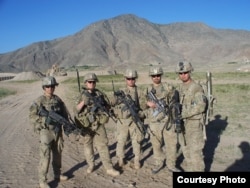While polls show that most Iowans had the U.S. economy on their minds when they participated in Monday's caucuses to choose a candidate for president, one group of caucus watchers was picking candidates with a different issue in mind.
Five thousand of Iowa's National Guard troops have served in Afghanistan since the U.S. went to war there after the September 11, 2001, terrorist attacks. And it has changed the perspective of many of them.
Sergeant Devin Burgett served in Afghanistan from 2010 to 2011 with Company B, 1st Battalion, 133rd Infantry Regiment of the Iowa National Guard. He was stationed in the east of the country in Torkham Gate, an area close to the Pakistani border. He also served in eastern Laghman province.
Burgett, who lives in Iowa City, said he would back a candidate who supports staying in Afghanistan to try to help the Afghan people.
“I would be happy to see a candidate who would win that shows appreciation to Afghans," he said, "because a lot of Afghans helped the U.S. and I think we owe it to them. I would be happy to see someone who would show a little gratitude to the people who fought alongside us in Afghanistan.”
Last year in October, President Barack Obama announced that American troops would remain in Afghanistan at the current level of 9,800 throughout 2016 as part of Resolute Support Mission. The plan had been to reduce that number this year, but because of Taliban advances, Obama postponed cutting troops to 5,500 until 2017.
Listening to generals
Sergeant Clayton Embre, who served alongside Burgett in Afghanistan, identified himself as a Republican.
“I am a Republican and will vote for the Republican Party. I like John Kasich and Ben Carson,” Embre told VOA.
He said national security and the economy were the most important things for him during the election season. On the issue of fighting the Islamic State group and terrorism, he said neither of his favorite GOP candidates has the necessary solutions to deal with that problem.
“Neither one of them knows exactly what to do and what they should do,” Embre said. “Obviously, they are smart enough to listen to generals and other people, and they will surround themselves with intelligent and smart people and do what they say.”
Sayed Monib, an Afghan interpreter who served with Embre’s unit in Afghanistan, lives in Cedar Rapids, Iowa. He found the primary process in Iowa interesting and told VOA that he was looking forward to being able to vote one day.
Only U.S. citizens can vote, and it can be a long process to become a citizen. Serving with the National Guard offers expedited citizenship.
Awaiting citizenship
Another interpreter who served with Iowa National Guard’s 168th Infantry Regiment told VOA that he is closely following the elections in the U.S.
“I would like to vote as an American one day. I consider myself part of America and am looking forward to my citizenship. I have a green card now and will soon vote,” Nabi Mohammadi said.
He drew a comparison between U.S. and Afghan elections: “Unlike Afghanistan, it’s a very transparent and clear process here. You get the results quicker here.”
Mohammadi has survived four attacks on his life — two improvised explosive device attacks and two rocket attacks — while serving with the U.S military in Afghanistan. He was in short-term disability for four months when the vehicle he was traveling in ran over an IED in Afghanistan.
Now he is living what he considers the American dream in Des Moines, Iowa, with his two kids and wife. He bought a house and studies information technology at Des Moines Area Community College.
Another Afghan, Sayed Mansoor Afzali, is a Fulbright student at Iowa State University in Ames, Iowa, where he now lives. He told VOA that he was very excited about the primary process as voters’ energy and enthusiasm reminded him of Afghanistan’s 2014 presidential elections, where he said Afghanistan demonstrated the same level of passion.
Afzali added that “I am truly lucky to be living in the U.S. at such an important and eventful time.”










